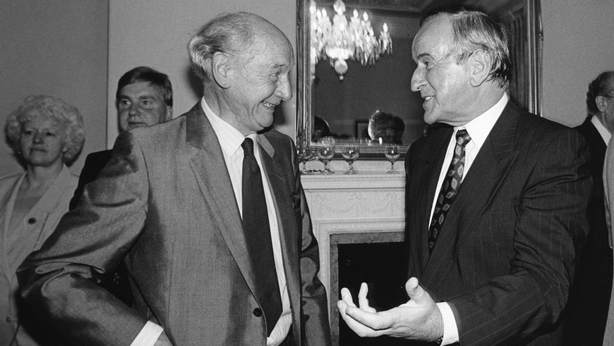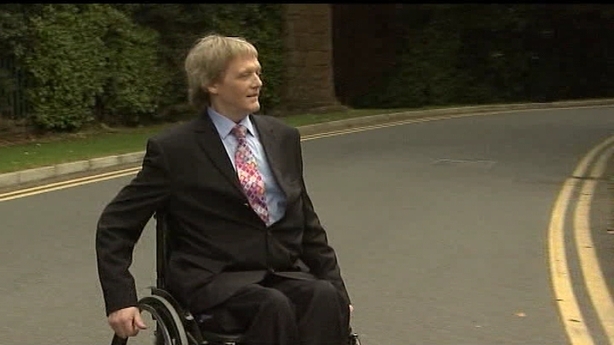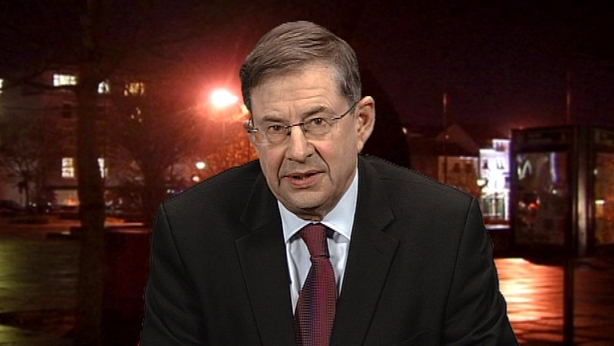The biography of Brian Crowley, Against the Odds, recalls the tight ship run by his mother, Sally, as she raised six children while running the local constituency operation for her husband, Flor, who was the Fianna Fáil TD for mid-Cork at the time.
The wooden spoon was taken out on rare occasions and the book recounts one time when she used in on the mischievous Brian. It broke in half, the story goes, and he kept the pieces to proudly show visitors and relatives what became of efforts to discipline him.
The book, published on his own website, describes the young Brian as "indignant when punished" and that is something few in Fianna Fáil could argue with. The party hierarchy never knew how to manage him, yet he always got the better of them with electoral performances which far out-polled the party.
Read more: MEP Brian Crowley announces retirement on health grounds
Brian’s upbringing was about as Fianna Fáil as you can get. He spent his weekends touring west Cork and sitting in pubs or hotels in Clonakilty, Dunmanway and Skibbereen while his father held constituency clinics.
Party heavyweights like Brian Lenihan, Albert Reynolds and Ray MacSharry were regular visits to his family home and he once recalled Charles Haughey giving him his first coin, a fifty pence piece, when ‘new money’ was introduced in 1971.
A year later, Flor Crowley was to side with Mr Haughey in an attempt to oust the then leader and fellow Corkman, Jack Lynch. This decision was to prove divisive among his constituency support base and he lost his seat in 1997 when Brian was 13.

It was a crushing disappointment for the young Brian but nothing to the difficulties he would face three years later when, at the age of 16 he had an accident that left him paralysed from the waist down. He had been playing rugby with his friends, on a flat felt roof, when he tripped over. He spent months in hospital in Dublin where his regular visitors included former Taoiseach and Fine Gael leader, Liam Cosgrave.
Brian was in the second year of his legal studies when, in 1993, the new Taoiseach, Albert Reynolds, phoned him and told him he wanted to nominate him to the Seanad. Mr Reynolds said he would be a "glorious example to the youth of the country" and "secondly to those with a disability".
We need your consent to load this rte-player contentWe use rte-player to manage extra content that can set cookies on your device and collect data about your activity. Please review their details and accept them to load the content.Manage Preferences
When Flor rang Mr Reynolds to suggest his son cut his hair which was down to his shoulders at the time, the Taoiseach reportedly responded that there were enough bald men in the party already.
Crowley ran for the European elections in 1994 for the constituency of Munster with a highly effective media campaign that included front page ads in the Irish Examiner and proved himself a strong debater on the airwaves.
He also proved himself a charismatic campaigner when he carried out extensive door to door canvassing - something that was unusual at the time in European elections where there is a lot of ground to cover. Afterwards, he claimed to have worn out four sets of wheelchair tyres to get elected.
On the day, he topped the poll with 84,000 - or almost a quarter of all first preference votes despite having been just a year in national politics - a performance he would not just repeat but surpass in the next four European elections.

Difficulties with the party hierarchy began in the 2004 European elections when headquarters ordered him to carve up Munster and seek first preference votes in Cork only, leaving Kerry, Limerick, Tipperary and Waterford to running mate Gerry Collins.
Mr Crowley was having none of it and publicly spoke out about the strategy: "People should vote for candidates in order of preference and that is the only type of democratic electioneering I will participate in," he said.
Mr Collins lost his seat and Mr Crowley became the Fianna Fáil leader in the European Parliament.
He had ambitions to run for the Presidency in 2011 but withdrew his bid in August of that year.
Not only did he state publicly at the time that the party was "divided" - which it was - on the question of whether to run a candidate, he subtly undermined Mr Martin’s approach to rebuilding the party after its massive electoral wipe-out earlier that year.
Mr Crowley missed much of the two years running up to the 2014 elections because of what he said were debilitating leg sores that resulted in him having to be hospitalised for months at a time. Despite his absence, he still secured 180,000 first preference votes continuing his trend.
The final blow in relations between the two came in 2014 when Mr Crowley - as Fianna Fáil’s only MEP - moved from the party’s chosen group in the European Parliament - the Alliance of Liberals and Democrats in Europe (ALDE) which it had joined in 2009 to the European Conservative and Reformists (ECR) group.
The party issued a statement saying that due to his "unilateral decision" he had "removed himself from the Fianna Fáil parliamentary party."

While some, including Éamon Ó Cuív (above) and Senator Mark Daly, defended him at the time, there was not much love lost between Mr Crowley and most of the parliamentary party.
According to Vote Watch Europe, a think tank that tracks parliamentary votes, he ranks last out of 751 MEPS in the current parliament for voting record since the 2014 elections.
He has been entitled to a monthly salary of €8,484 as well as a €4,342 monthly allowance to cover office rent and constituency work.
True to his reputation as something of a political enigma, Mr Crowley kept most of his former party colleagues guessing on his intentions up until making his final announcement.
Never one to have got stuck in to the everyday business of the parliamentary party in the first place, he had lost touch with most of his colleagues in recent times.
As he bows out of politics, he can point to an exemplary record as a vote-getter who never allowed the limits of geography, his party or indeed his disability get in the way of his unrivalled popular support. He achieved it, as his book says, against the odds.






